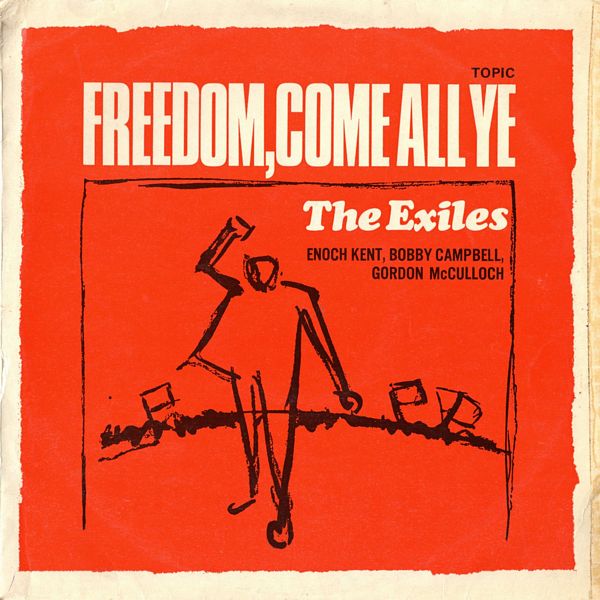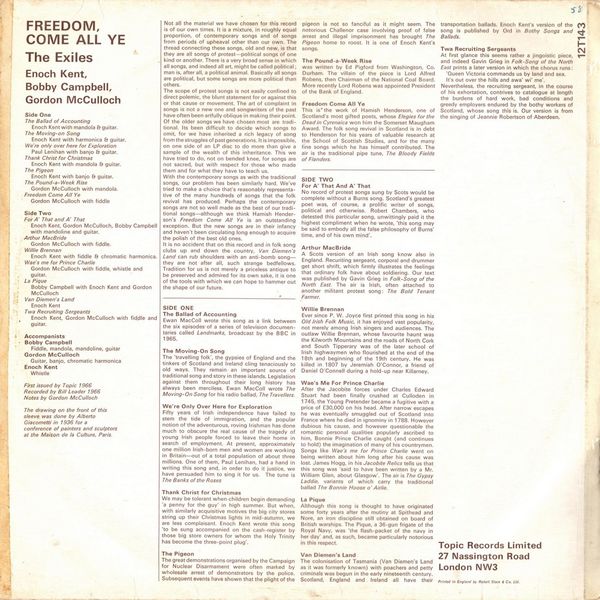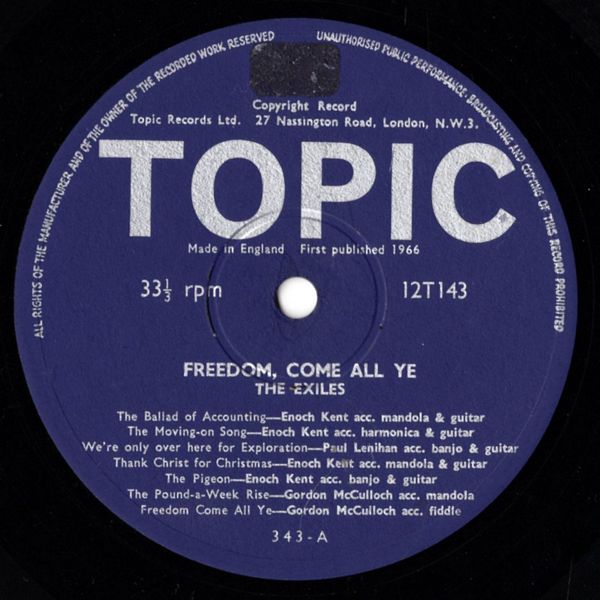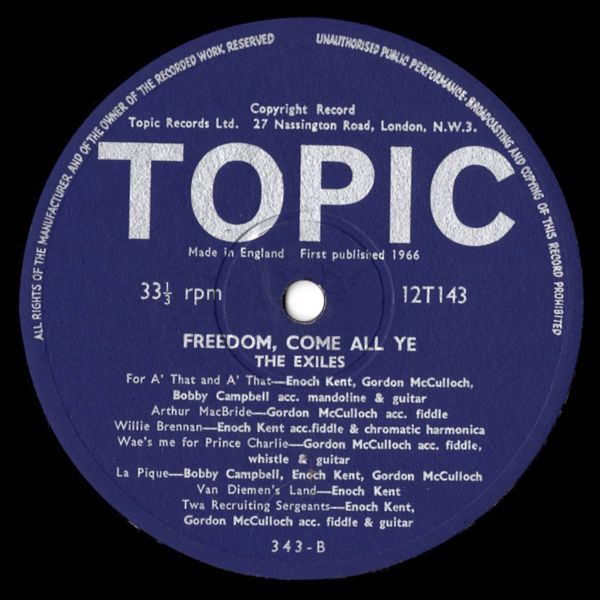
 |



|
Sleeve Notes
Not all the material we have chosen for this record is of our own times. It is a mixture, in roughly equal proportion, of contemporary songs and of songs from periods of upheaval other than our own. The thread connecting these songs, old and new, is that they are all songs of protest-political songs of one kind or another, There is a very broad sense in which all songs, and indeed all art, might be called political; man is, after all, a political animal. Basically all songs are political, but some songs are more political than others.
The scope of protest songs is not easily confined to direct polemic, the blunt statement for or against this or that cause or movement. The art of complaint in songs is not a new one and songwriters of the past have often been artfully oblique in making their point. Of the older songs we have chosen most are traditional. Its been difficult to decide which songs to omit, for we have inherited a rich legacy of song from the struggles of past generations. It is impossible, on one side of an LP disc to do more than give a sample of the wealth of this inheritance. This we have tried to do, not on bended knee, for songs are not sacred, but with respect for those who made them and for what they have to teach us.
With the contemporary songs as with the traditional songs, our problem has been similarly hard. We've tried to make a choice that's reasonably representative of the many hundreds of songs that the folk revival has produced. Perhaps the contemporary songs are not so well made as the best of our traditional songs-although we think Hamish Henderson's Freedom Come All Ye is an outstanding exception. But the new songs are in their infancy and haven't been circulating long enough to acquire the polish of the best old ones.
It is no accident that on this record and in folk song clubs up and down the country, Van Diemen's Land can rub shoulders with an anti-bomb song- they are not after all, such strange bedfellows. Tradition for us is not merely a priceless antique to be preserved and admired for its own sake, it is one of the tools with which we can hope to hammer out the shape of our future.
The Ballad of Accounting — Ewan MacColl wrote this song as a link between the six episodes of a series of television documentaries called Landmarks, broadcast by the BBC in 1965.
The Moving-On Song — The 'travelling folk', the gypsies of England and the tinkers of Scotland and Ireland cling tenaciously to old ways. They remain an important source of traditional song and story in these islands. Legislation against them throughout their long history has always been merciless. Ewan MacColl wrote The Moving-On Song for his radio ballad, The Travellers.
We're Only Over Here for Exploration — Fifty years of Irish independence have failed to stem the tide of immigration, and the popular notion of the adventurous, roving Irishman has done much to obscure the real cause of the tragedy of young Irish people forced to leave their home in search of employment. At present, approximately one million Irish-born men and women are working in Britain — out of a total population of about three millions. One of them, Paul Lenihan, had a hand in writing this song and, in order to do it justice, we have persuaded him to sing it for us. The tune is The Banks of the Roses
Thank Christ for Christmas — We may be tolerant when children begin demanding 'a penny for the guy' in high summer. But when, with similarly acquisitive motives the big city stores string up their Christmas lights in mid-autumn, we are less complaisant. Enoch Kent wrote this song 'to be sung accompanied on the cash-register by those big store owners for whom the Holy Trinity has become the three-point plug'.
The Pigeon — The great demonstrations organised by the Campaign for Nuclear Disarmament were often marked by wholesale arrest of demonstrators by the police. Subsequent events have shown that the plight of the pigeon is not so fanciful as it might seem. The notorious Challenor case involving proof of false arrest and illegal imprisonment has brought The Pigeon home to roost. It is one of Enoch Kent's songs.
The Pound-a-Week Rise — was written by Ed Pigford from Washington, Co. Durham. The villain of the piece is Lord Alfred Robens, then Chairman of the National Coal Board. More recently Lord Robens was appointed President of the Bank of England.
Freedom Come All Ye — This is the work of Hamish Henderson, one of Scotland's most gifted poets, whose Elegies for the Dead in Cyrenaica won him the Somerset Maugham Award. The folk song revival in Scotland is in debt to Henderson for his years of valuable research at the School of Scottish Studies, and for the many fine songs which he has himself contributed. The air is the traditional pipe tune, The Bloody Fields of Flanders.
For A' That And A' That — No record of protest songs sung by Scots would be complete without a Burns song. Scotland's greatest poet was, of course, a prolific writer of songs, political and otherwise. Robert Chambers, who detested this particular song, unwittingly paid it the highest compliment when he wrote, 'this song may be said to embody all the false philosophy of Burns' time, and of his own mind'.
Arthur MacBride — A Scots version of an Irish song know also in England. Recuriting sergeant, corporal and drummer get short shrift, which firmly illustrates the feelings that ordinary folk have about soldiering. Our text was published by Gavin Grieg in Folk-Song of the North East. The air is Irish, often attached to another militant protest song: The Bold Tenant Farmer.
Willie Brennan — Ever since P. W. Joyce first printed this song in his Old Irish Folk Music, it has enjoyed vast popularity, not merely among Irish singers and audiences. The outlaw Willie Brennan, whose favourite haunt was the Kilworth Mountains and the roads of North Cork and South Tipperary was of the later school of Irish highwaymen who flourished at the end of the 18th and beginning of the 19th century. He was killed in 1807 by Jeremiah O'Connor, a friend of Daniel O'Connell during a hold-up near Killarney.
Wae's Me For Prince Charlie — After the Jacobite forces under Charles Edward Stuart had been finally crushed at Culloden in 1745, the Young Pretender became a fugitive with a price of £30,000 on his head. After narrow escapes he was eventually smuggled out of Scotland into France where he died in ignominy in 1788. However dubious his cause, and however questionable the romantic personal qualities popularly ascribed to him, Bonnie Prince Charlie caught (and continues to hold) the imagination of many of his countrymen. Songs like Wae's me for Prince Charlie went on being written about him long after his cause was lost. James Hogg, in his Jacobite Relics tells us that this song was 'said to have been written by a Mr. William Glen, about Glasgow'. The air is The Gypsy Laddie, variants of which carry the traditional ballad The Bonnie Hoose o' Airlie.
La Pique — Although this song is thought to have originated some forty years after the mutiny at Spithead and Nore, an iron discipline still obtained on board of British warships. The Pique, a 36-gun frigate of the Royal Navy, was 'the flash-packet of the navy in her day' and, as such, became particularly notorious in this respect.
Van Diemen's Land — The colonisation of Tasmania (Van Diemen's Land as it was formerly known) with poachers and petty criminals was begun in the early nineteenth century. Scotland, England and Ireland all have their transportation ballads. Enoch Kent's version of the song is published by Ord in Bothy Songs and Ballads.
Twa Recruiting Sergeants — At first glance this seems rather a jingoistic piece, and indeed Gavin Grieg in Folk-Song of the North East prints a later version in which the chorus runs:
'Queen Victoria commands us by land and sea.
It's out over the hills and awa' wi' me'.
Nevertheless, the recruiting sergeant, in the course of his exhortation, contrives to catalogue at length the burdens of hard work, bad conditions and greedy employers endured by the bothy workers of Scotland, whose song this is. Our version is from the singing of Jeannie Robertson of Aberdeen.